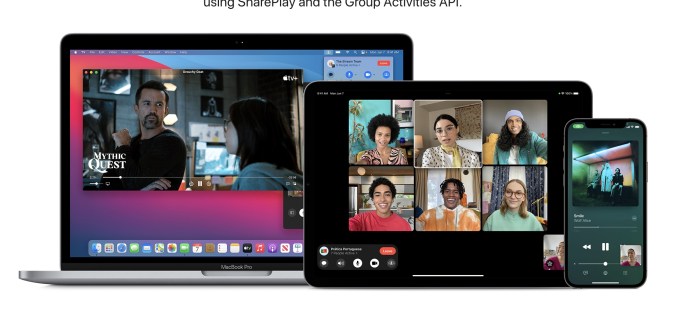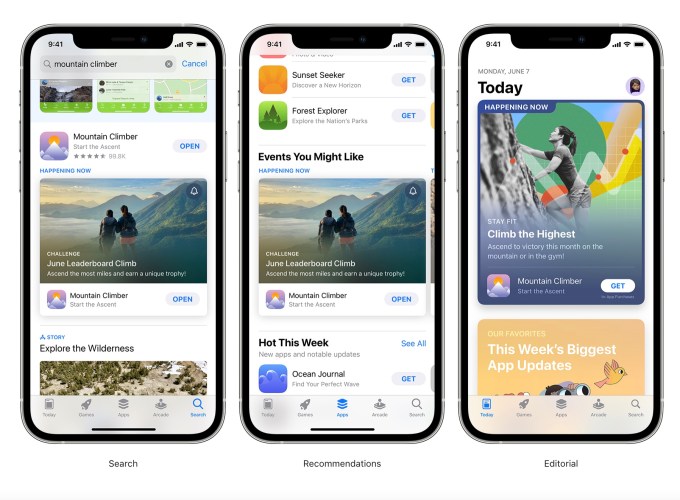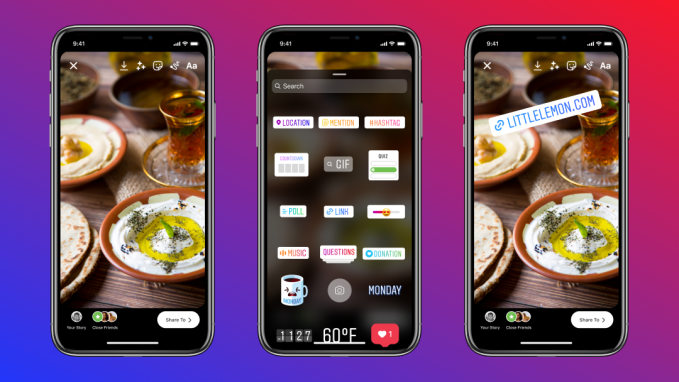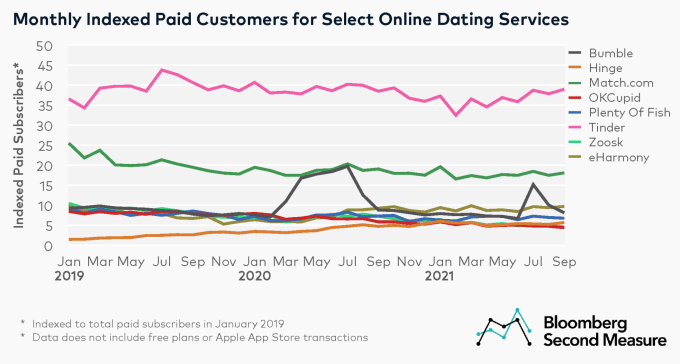Welcome back to This Week in Apps, the weekly TechCrunch series that recaps the latest in mobile OS news, mobile applications and the overall app economy.
The app industry continues to grow, with a record 218 billion downloads and $143 billion in global consumer spend in 2020. Consumers last year also spent 3.5 trillion minutes using apps on Android devices alone. And in the U.S., app usage surged ahead of the time spent watching live TV. Currently, the average American watches 3.7 hours of live TV per day, but now spends four hours per day on their mobile devices.
Apps aren’t just a way to pass idle hours — they’re also a big business. In 2019, mobile-first companies had a combined $544 billion valuation, 6.5x higher than those without a mobile focus. In 2020, investors poured $73 billion in capital into mobile companies — a figure that’s up 27% year-over-year.
This Week in Apps offers a way to keep up with this fast-moving industry in one place with the latest from the world of apps, including news, updates, startup fundings, mergers and acquisitions, and suggestions about new apps and games to try, too.
Do you want This Week in Apps in your inbox every Saturday? Sign up here: techcrunch.com/newsletters
Apple SharePlay Arrives

Image Credits: Apple
Apple’s new FaceTime feature SharePlay wasn’t immediately available with the iOS 15 launch, as it needed a bit more polish. But with this week’s release of iOS 15.1, SharePlay — and a number of mobile app updates ready to support it — have finally arrived. The feature makes using Apple’s video calling platform more interactive and could help to potentially lock in users to Apple’s ecosystem.
As with many Apple features, SharePlay is easy to use despite the complicated technology powering the new system that runs under the hood. With the tap of a button on FaceTime’s controls, you can start sharing your device’s screen on your call or you can just switch over to the app you want to co-watch with a friend — the app alerts you upon arrival that it supports SharePlay as well as how to get started.
While screen sharing, you can view your screen or other apps together. However, you won’t have a good experience trying to co-watch videos this way due to lags. Apple also smartly blocks other viewers from seeing your incoming notifications or any kind of application pop-ups or dialogs, as they may contain sensitive information. And everything is end-to-end encrypted, so you can feel comfortable screen sharing in a business setting, not just a personal one. (And this will be further improved when SharePlay arrives on macOS Monterey later this fall.)
If anything, the biggest obstacle to using SharePlay at launch is simply availability.
Apple has a robust lineup of launch partners for the new addition — but unless you’ve happened across the App Store’s editorial round-up of SharePlay-enabled apps (do a search for “shareplay” to find it), you may not know if your favorite app is “SharePlay ready” as of yet.
Initially, SharePlay is rolling out to apps, including Apple TV+, Apple Fitness, TikTok, NBA: Live Games & Scores, Paramount+, Showtime, Kahoot!, Cameo, SmartGym, Flow, Moon FM, MUBI, Digital Concert Hall, Piano with Friends, Relax Melodies, LookUp, Heads Up!, CARROT Weather, Apollo, Night Sky and others. Disney+ will soon support SharePlay, as will ESPN, HBO Max, Hulu, MasterClass, Twitch, Pluto TV and more.
While that’s pretty decent right out of the gate, it is missing one key player: Netflix.
You have to wonder what’s going there — is it in the works? Being held back as a negotiating tactic? Is Netflix…just not interested? As you might recall, Netflix was one of the few streamers that didn’t add a native co-watching feature (or at least officially partner with another software maker) during the pandemic, while everyone else was busy building remote social experiences. Competitors like Hulu, Amazon Prime Video, Plex, HBO and others rolled out co-viewing experiences. But Netflix sat out the trend, despite the growing popularity of third-party co-viewing apps like Netflix Party. With Netflix’s more recent slower growth following the pandemic’s peak, you would think the company would see SharePlay as a potential source of new user acquisition.
After all, SharePlay can be used to offer a free user without an account a way to co-watch with a paid subscriber, if that’s what the developer wants. This, in turn, could then be used to push the free user to buy a subscription after some time has passed — like after they got hooked on some exclusive shows, perhaps. It seems like a no-brainer to offer support for this sort of thing — but perhaps Netflix is building out its own version where it can collect more data as a first-party experience. Time will tell.
In the meantime, the SharePlay feature could appeal to younger people who already use FaceTime the way older people use the Phone app, and who are comfortable multi-tasking on their devices.
In-App Events Go Live

Image Credits: Apple
A whole new way to market apps has now appeared on the App Store. On Wednesday, the first in-app events began appearing on the App Store, giving users a new way to find out what’s happening inside their favorite apps and games right now. At launch, Rise of Kingdoms and Pokémon GO are promoting Halloween special events, for example, as are others. But in-app events could also be used to promote things like movie premieres or live sports in the future. When users tap a new event card on the App Store (in iOS 15 or iPadOS 15), they’ll be taken directly to the event taking place. They can also tap “Notify Me” to get alerts when upcoming events go live, share events with friends or add them to their calendar app.
Other games adopting the feature include Call of Duty: Mobile, PUBG Mobile, Clash Royale and Genshin Impact and soon, so will apps like Tinder, TikTok, Disney+, Hulu, Paramount+, HBO Max and ESPN.
Platforms: Apple
- Apple released iOS 15.2 and iPadOS 15.2 beta 1, as well as watchOS 8.3. One of the biggest new features to arrive in the iOS/iPadOS beta is the App Privacy Report. First announced at WWDC, the report will show users what apps are up to — that is, which sensitive data they request, which sensors they’re using and which domains they’re contacting to possibly share that information further. Other new features include an updated Emergency SOS call feature; and an easier to read, card-style Notification Summary.
- Apple released iOS 15.1 and iPadOS 15.1 to the general public, bringing support for SharePlay, ProRes video capture, the ability to disable automatic camera switching to Macro mode, support for COVID vaccination cards and test results in Wallet and many other improvements.
- Apple also released iOS 14.8.1 and iPadOS 14.8.1, with several critical security updates, making good on its promise to keep people on older software up to date with necessary fixes.
- Apple now lets you review more of its default apps, including Phone, Messages, Photos and Safari, among others, including default Watch apps. The company had earlier rolled out a selection of its apps as standalone downloads with support for ratings and reviews, to put Apple on a more even playing field with regard to competitors amid regulatory scrutiny over its App Store. Most of the new apps are doing well in reviews so far, as people seem to appreciate the functionality provided by Apple’s default experiences.
- Apple refreshed its set of design resources for iOS 15 on a revamped website that makes it easier to find the things you need, like templates or fonts. The site includes new templates, libraries, fonts and other iOS 15-specific resources and components.
- The company also opened Apple Entrepreneur Camp applications for one of three newly announced online cohorts for Black, Hispanic/Latinx, or female founders starting late January 2022.
Platforms: Google
- Google held its annual Android Dev Summit this week, where it announced a series of updates for developers. The summit included over 30 Technical Talks to help developers build apps that run across devices and learn about the latest in developer tools.
- Google announced the 12L, an OS designed for large screens, along with a set of tools, at the Dev Summit event.
- The company also released the first alpha of Compose Material 3, which offers “Material Design 3 styled components and theme, enabling Material You personalization features like dynamic color.” Google also released the first beta version of Jetpack Compose 1.1, which has features like “stretch overscroll for Android 12, improved touch-target sizing, experimental lazy layout animations,” and others. And Compose for Wear OS is now in developer preview.
Augmented Reality

Image Credits: Snap
- Snapchat rolled out Halloween AR Lenses, including those for finding a Halloween costume through AR in partnership with Walmart, a Halloween World Lens, one with The Home Depot’s 12-foot Skeletons, a transforming “Werewolf Lens,” a Lens for decorating your home in AR, a spooky fashion Lens, and others with candy brands like Mars-Wrigley, Skittles, Starburst and Reese’s.
Fintech
- Robinhood reported a revenue miss for its third-quarter earnings, sending the stock down 8% in after-hours trading on Tuesday. The company reported total net revenue at $365 million, versus the $431.5 million Wall Street expected. Revenues were up 35% year over year but were below the second quarter’s revenue of $565 million.
Social

Image Credits: Instagram
- Instagram will now allow all users to share links in their Instagram Stories via the new Link Stickers, making the final move away from the “swipe up to read” gesture. The feature was previously limited to select creators.
- TikTok is testing a new direct tipping feature with select creators. The feature lets fans tip favorite creators outside of TikTok LIVE streams where gifting is already available.
- TikTok brings its Video Kit feature to desktop, web and consoles, in addition to its previous support for mobile apps. The expansion will allow professional creators and others to use a variety of editing and collaboration tools to make their TikTok videos, which they can then publish directly using the “Share to TikTok” functionality provided by the SDK. Early adopters include Clipchamp, Combo, Grabyo, Kapwing, Mobcrush and LG U+.
- Twitter’s subscription service Blue adds a “Labs” feature that provides early access to tools Twitter is considering for the premium service. The first two Labs features include the ability to pin favorite DM conversations on iOS to the top of your DM inbox and support for longer video uploads (up to 10 mins.) on desktop.
- Twitter said it added 5 million users in its third quarter, to reach average monetizable DAUs (its own metric) of 221 million, up 13% year-over-year. Revenue increased 37% to $1.28 billion, as the company noted Apple’s privacy changes with ATT only had a “modest impact” on its business.
- Snapchat now has 100 million MAUs in India, and is partnering with Flipkart and Android smartphone vendors to increase adoption.
- Facebook reported a miss on revenue, citing Apple’s privacy changes as one cause, ahead of its big announcement about a shift to focus on its metaverse and VR products and a rebranding of the company to “Meta.” Facebook reported $29 billion in total revenue and earnings per share of $3.22, calculated on a diluted basis. Investors had expected revenues of $29.58 billion and earnings per share of $3.19.
Messaging
Streaming & Entertainment
- Spotify says its service is now used more by U.S. podcast listeners than Apple Podcasts. The company made the announcement during its Q3 earnings, citing its own internal data and Edison Research (where it’s a client). It did not say how many podcast listeners it had, but noted MAUs overall grew 19% year-over-year to reach 381 million in the quarter, up from 365 million last year. Premium subscribers also grew 19% to reach 172 million, up from 165 million last year. Spotify revenue was $2.9 billion in the quarter, up 27% year-over-year, with ad sales rising 75% to reach $374 million, at the top end of its guidance.
- Clubhouse added a new Pinned Links feature that allows room creators and moderators to share URLs at the top of the room’s pages, similar to how Twitter Spaces users can add tweets to their live audio sessions.
- Amazon is working on a Clubhouse competitor codenamed Project Mic, The Verge reported. The new app would let anyone make and distribute live radio shows that include music, which users can listen to through Audible, Amazon Music, Twitch and Alexa devices.
Dating
- Match-owned dating app Hinge introduces a new “Voice Prompts” feature that gives users a new way to interact, by answering a prompt through a 30-second recording. The company hopes the voice feature will give users a peek into someone’s personality and hint at what a first date might be like.
- Chinese dating app Lesdo, designed for lesbian women, announced it was shutting down. This specific niche of online dating has failed to scale and make a profit in the country, despite a potential audience of 10 million in China. Contributing to the problem of scale is a hostile environment for the LGBTQ+ community, as Beijing has pressured charities not to work with queer activists and WeChat deactivated queer groups’ public accounts, Protocol reported.
- Tinder continued to lead the dating app market with the highest number of paid subscribers, followed by Match.com, according to new data shared by Bloomberg’s Second Measure.

Image Credits: Bloomberg Second Measure
Gaming
- Google Stadia rolls out a free, 30-minute game trial to woo people to its service. The option is being made available on its exclusive title Hello Engineer as a test, but Google confirmed it would expand the feature to other games in the next couple of months.
- Amazon Luna’s game streaming service announced plans to add new titles in November, including Carrion, Gris and Mortal Shell: Enhanced Edition on the Luna+ Channel, and PHOGS! on the Family Channel. It also recently rolled out Alien Isolation, Amnesia: Rebirth, Far Cry 6, Olija, Riders Republic and others.
News & Reading
- Apple News expanded its local news coverage to Charlotte, Miami and Washington, D.C., giving users access to numerous publications such as Axios Charlotte, the Charlotte Observer, Eater Miami, the Miami Herald, DCist, Washingtonian, The Washington Post and others. The company also said it’s expanding Fitness+ and its Apple One Premier subscription bundle to 17 more countries on November 3.
Health & Fitness
- Apple rolled out support for COVID-19 vaccination cards and test results in Wallet with the release of iOS 15.1. Vaccination and test result records are downloaded in a verifiable format that’s digitally signed by a vaccine or test result provider, Apple says.
Government & Policy

Image Credits: Samuel Corum/Getty Images
- This week, reps from TikTok, Snap and YouTube faced Congress to talk about how their apps are addressing kids and online safety as the U.S. considers legislation that would require tech companies to offer a safer environment for kids online. One of the highlights from the hearing was listening to senators try to get the companies on the record as to whether or not they support specific legislation, like the upcoming COPPA revamp, which only TikTok fully said “yes” to. When asked about the KIDS Act, which would prevent manipulative marketing (like undisclosed influencer marketing), there was less support. Companies said they would be happy to “look” at the details as if the Act was new, and not something that had already been around for a while.
- TikTok dodged questions about its plans for biometric data collection during its first-ever Senate hearing. In an update to the company’s U.S. privacy policy in June, TikTok added a new section that noted the app “may collect biometric identifiers and biometric information” from its users’ content, including things like “faceprints and voiceprints.” The company was questioned by multiple lawmakers on this matter during a hearing conducted by the Senate Subcommittee on Consumer Protection, Product Safety, and Data Security, which was focused on social media’s detrimental impacts on children and teens.
- The lawmakers also asked YouTube and Snap to defend their apps’ age ratings on the app stores, where they were sometimes rated 13 and up or 17 and up, depending on the platform. Snap was also pressed on whether its content was even appropriate for younger teens, given the app’s Discover page contained content that Sen. Mike Lee (R-UT) deemed “wildly inappropriate” for a child, like “recommendations for…an invite to play an online sexualized video game that’s marketed itself to people who are 18 and up; tips on, quote, ‘why you shouldn’t go to bars alone;’ notices for video games that are rated for ages 17 and up; and articles about porn stars,” he said.
- The senators also asked TikTok, Snap and YouTube how they handled eating disorder content, after Facebook whistleblower Frances Haugen‘s document leaks exposed Facebook’s knowledge that Instagram could be dangerous for teenage girls with body image issues.
- In non-hearing news, Apple is “very likely” going to face a DOJ antitrust lawsuit, The Information reported this week, citing sources with knowledge of the matter.
Security & Privacy
- Malware-laden “Squid Game”-themed apps have been found in the Google Play Store, including an app for Squid Game wallpaper that infected phones with Joker malware, allowing hackers to sign up the user for premium services they profit from.









Pikmin Bloom
Niantic’s attempt to once again replicate the success of Pokémon GO, in a way that Harry Potter: Wizards Unite has not really been able to, arrived this week. The company announced the launch of a new AR game Pikmin Bloom in collaboration with Nintendo. The game, like Pokémon GO, encourages users to go outside and explore — but now, instead of capturing Pokémon, they’ll collect seedlings and a squad of “Pikmin” — a sort of plant-animal hybrid creature. As you walk, you’ll leave AR trails of flowers behind you. The game will also later host monthly “Community Days” for Pikmin so users can plant and play together. Overall, the game seems less competitive than Pokémon GO and may be aimed at someone who wants more casual gameplay. The game initially rolled out to Singapore and Australia, then the U.S., and will continue to roll out globally.
Matterport 3D Capture (Android)
Matterport brought its 3D capture app to Android users, which allows customers to digitize their home, office or hotel with any compatible Android device, for free. Homeowners can use the app to create a digital appraisal of their property and everything in it for insurance, space planning or just peace of mind. Meanwhile, builders can plan and manage their construction projects along with designers, contractors and clientele. And real estate agents and rental property managers can quickly capture and publish 3D virtual experiences online, then share them across websites and social networks. The Matterport App for Android is available now on Google Play and can be used with a free account.

